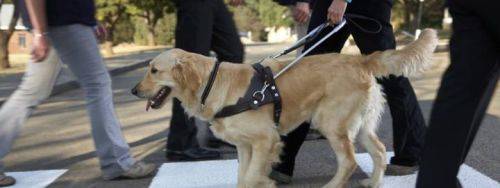Make a Difference: Donate to the S A Guide-Dogs Association today!
By donating to the South African Guide-Dogs Association for the Blind, you are directly supporting our work to enhance the mobility, independence and dignity of people who are visually-impaired/physically disabled and autistic children.

History
More than half a century ago, Gladys Evans, whose eyesight was slowly failing, travelled overseas in order to train with Guide Dogs for the Blind Association in the United Kingdom. Evans returned to the African continent with her new Guide Dog Sheena. In 1953, she established South African Guide-Dogs Association for the Blind so that other visually impaired people could enjoy the independence, mobility and companionship that a Guide Dog brings. The Association trains Guide Dogs, Service Dogs, Autism Support Dogs and Orientation and Mobility practitioners.
Guide Dogs
Guide Dog breeding lines are carefully selected to produce healthy dogs with a good working ability. Each puppy’s first year is spent in the home of a volunteer Puppy Raiser, where the pup is thoroughly socialised before it returns to the Association at around one year of age for 6 months of formal training. All applicants and dogs are carefully matched based on the individual's specific needs (environment, mobility needs, dog handling skills, etc.) as well as the dog's own capabilities (natural speed, energy requirements, optimum environment, etc.).
Service and Autism Support Dogs
The Association trains Service Dogs to assist people who are physically disabled. A Service Dog assists its owner by retrieving dropped items, opening and closing doors, turning on light switches, barking on command and many more useful tasks.
An Autism Support Dog plays a role in making the world a less threatening and lonely place for the autistic child. Children on the Autism Spectrum are prone to “bolting” or running off and the presence of the dog prevents this from occurring. The family are able to visit malls, parks, and beaches without the constant fear that the child may run off. An added benefit is that autistic children are also less isolated from society. The families notice that the autistic child’s social interactions usually improve.
Working Dogs are available to any person regardless of their financial position (provided they can afford to feed and care for the dog on a daily basis). Working Dog owners pay R100 towards their board and lodging for a two week stay at our training residence and a further R5 to purchase the dog. Thereafter, the dog becomes the sole responsibility of the owner, though the Association offers a follow up and monitoring service for the lifetime of the dog.
College of Orientation and Mobility
The College of Orientation and Mobility (COM) was established in 1974. COM assists people who are visually impaired by offering three services. COM offers a two year SETA accredited diploma course to sighted people who will be trained to become Orientation and Mobility (O & M) Practitioners. On qualification an O & M practitioner is able to assist people who are visually impaired with mobility and skills of daily living training. O & M practitioners are employed by other Non Profit Organisations throughout the country. Each practitioner is able to assist 40 visually impaired people per year. COM’s O & M practitioners offer direct assistance to visually impaired people where possible. COM is able to offer advice and a referral service to people who are visually impaired about the services that are available and how these services can be accessed.






